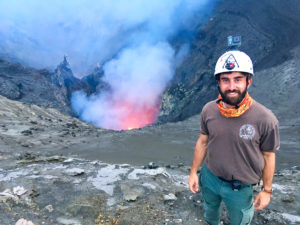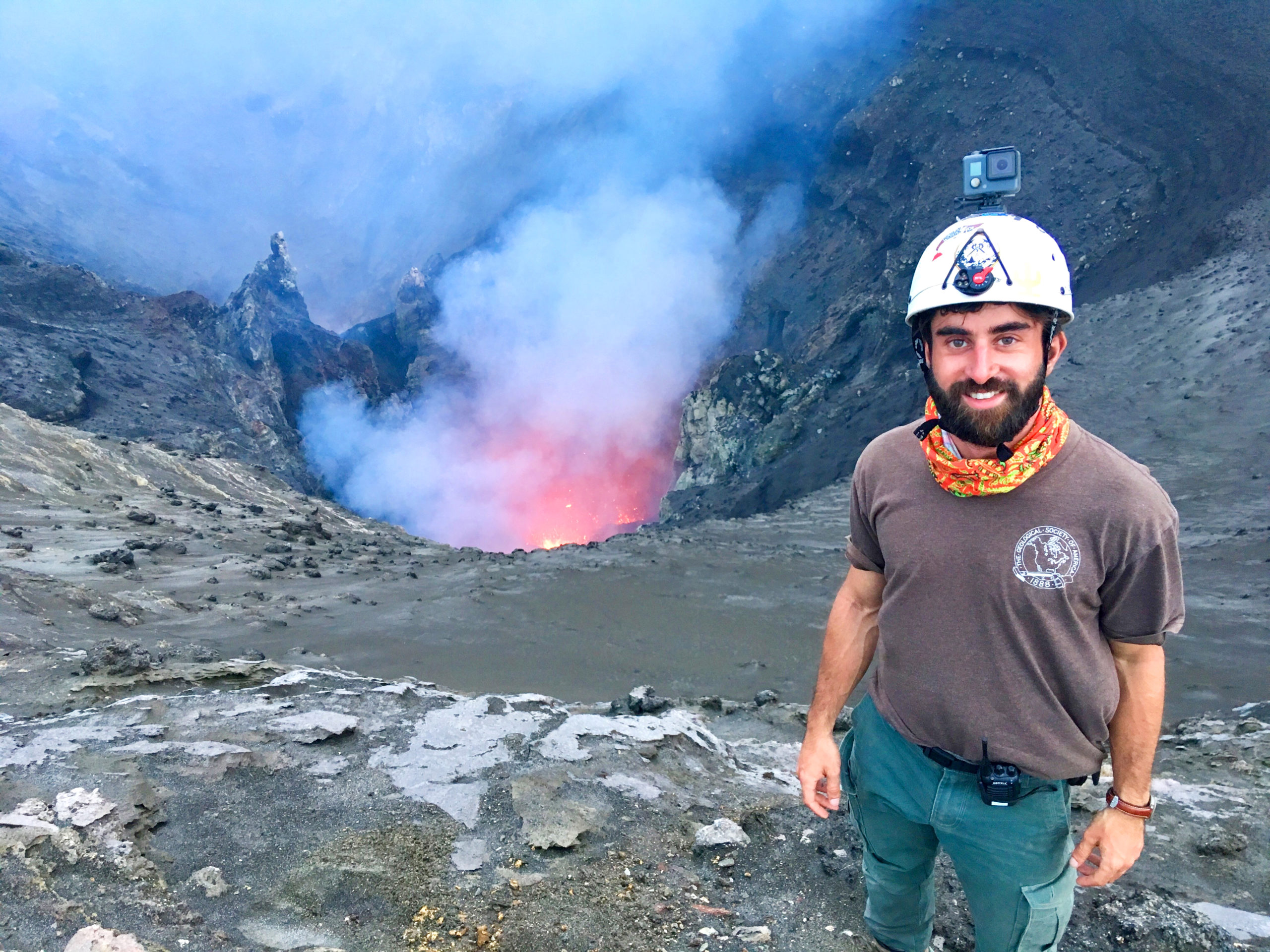May 12, 2020

João Lages, who earned his master’s degree in geology from Highlands, stands in front of the Benbow lava lake at the Ambrym volcano in the Republic of Vanuatu in the South Pacific Ocean.
Las Vegas, N.M. – João Lages earned his master’s degree in geology from New Mexico Highlands University and is now pursuing postdoctoral studies in geology with a focus on monitoring the hazards of active volcanoes.
Lages completed his Ph.D. in volcanology and geochemistry in the Department of Earth and Marine Sciences at the University of Palermo in Italy. He said he grew up fascinated with volcanoes and their ability to completely transform landscapes in the blink of an eye.
“My postdoctoral studies focus on information that can contribute decisively to our ability to monitor transitions between different phases of active volcanoes,” Lages said. “As well as volcano-monitoring applications, our research methods also offer valuable insights into magma and gases in volcanic settings.”
Looking ahead, Lages has his sights set on an academic career involving teaching volcanology-related subjects as well as continuing his research.
“To me it is very important that my work has impact in positive ways. Volcanoes are a very serious hazard worldwide and it is crucial that we communicate our science effectively with communities directly affected by them. Whatever challenges I take on next, I hope to have the chance to continue to increase awareness of volcanic hazards,” Lages said.
Lages, who is Portuguese, came to Highlands as an international exchange student through Highlands’ geology partnership with l’Université Blaise Pascal in France. His graduate adviser at Highlands was geology professor Michael Petronis and his adviser at Blaise Pascal was Benjamin van Wyk DeVries.
“João came to Highlands with very strong background in geochemistry and easily adapted to the geophysics focus of his studies here,” Petronis said. “One of João’s strengths is his ability and motivation for self-study learning of new material. Then he asks the right questions, an important ability for a scientist.”
Petronis said he is confident Lages will contribute greatly to the fields of volcanology and the geosciences.
Lages said the graduate geology program at Highlands stands out as a program that provides its students with the freedom to invest their time developing research projects they are passionate about.
“My thesis at Highlands aimed at reconstructing the eruptive growth of monogenetic volcanoes, a type of volcano formed through a single episode of volcanic activity,” Lages said. “My study areas focused on the inactive Lemptégy volcano in Auvergne, France, and the inactive Cerros del Rio volcanic field on the western edge of Santa Fe, New Mexico.”
In addition, Lages said developing and advancing his own research at Highlands gave him crucial skills going into his Ph.D. program, including discipline, responsibility, self-motivation and autonomy.
Lages said Michael Petronis’ influence was invaluable.
“Dr. Petronis’ enthusiasm and knowledge on the subject of volcanology made my journey as an exchange student easier and more enjoyable. Dr. Petronis was always very supportive,” Lages said.
Lages said he was also fortunate to work with Highlands geology professor Jennifer Lindline.
“Dr. Lindline’s skills as a mineralogist-petrologist complemented my research project tremendously. I’ll always be grateful to both Dr. Petronis and Dr. Lindline for their guidance, friendship and support,” Lages said.
Lages said he benefited a great deal from the environmental geology program at Highlands.
“The multidisciplinary view on geology and environment-related topics certainly helped me become a better scientist,” Lages said.
Lages said he also grew outside the classroom and laboratory at Highlands.
“The cultural exchange as an international student at Highlands is something you carry your entire life and certainly one of the highest rewards of studying abroad,” Lages said.

